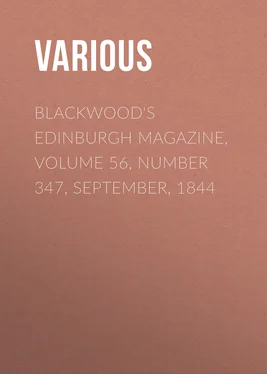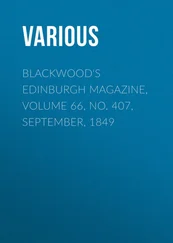Various - Blackwood's Edinburgh Magazine, Volume 56, Number 347, September, 1844
Здесь есть возможность читать онлайн «Various - Blackwood's Edinburgh Magazine, Volume 56, Number 347, September, 1844» — ознакомительный отрывок электронной книги совершенно бесплатно, а после прочтения отрывка купить полную версию. В некоторых случаях можно слушать аудио, скачать через торрент в формате fb2 и присутствует краткое содержание. Издательство: Иностранный паблик, Жанр: foreign_antique, periodic, foreign_edu, на английском языке. Описание произведения, (предисловие) а так же отзывы посетителей доступны на портале библиотеки ЛибКат.
- Название:Blackwood's Edinburgh Magazine, Volume 56, Number 347, September, 1844
- Автор:
- Издательство:Иностранный паблик
- Жанр:
- Год:неизвестен
- ISBN:нет данных
- Рейтинг книги:3 / 5. Голосов: 1
-
Избранное:Добавить в избранное
- Отзывы:
-
Ваша оценка:
- 60
- 1
- 2
- 3
- 4
- 5
Blackwood's Edinburgh Magazine, Volume 56, Number 347, September, 1844: краткое содержание, описание и аннотация
Предлагаем к чтению аннотацию, описание, краткое содержание или предисловие (зависит от того, что написал сам автор книги «Blackwood's Edinburgh Magazine, Volume 56, Number 347, September, 1844»). Если вы не нашли необходимую информацию о книге — напишите в комментариях, мы постараемся отыскать её.
Blackwood's Edinburgh Magazine, Volume 56, Number 347, September, 1844 — читать онлайн ознакомительный отрывок
Ниже представлен текст книги, разбитый по страницам. Система сохранения места последней прочитанной страницы, позволяет с удобством читать онлайн бесплатно книгу «Blackwood's Edinburgh Magazine, Volume 56, Number 347, September, 1844», без необходимости каждый раз заново искать на чём Вы остановились. Поставьте закладку, и сможете в любой момент перейти на страницу, на которой закончили чтение.
Интервал:
Закладка:
The revolution of 1830 gave a wonderful stimulant to the little society of St Simon. It extended rapidly, and adjourned its sittings from a private house to an ample theatre, where three tiers of boxes held the admiring or ironical auditory. Fêtes, and the presence of charming women, increased the number of proselytes; artists, physicians, advocates, poets, flocked to share in the generous hopes of the new era. The capital and the provinces were portioned out into new departments, to accord with the new administration of affairs, and St Simonism had also its map of France. The two chiefs, or fathers, took upon themselves the ambitious title of popes. They already cast their eyes upon the Tuileries. Louis-Philippe was summoned by letter to yield his place to MM. Enfantin and Buzard. St Simonism was already a government destined to replace the authority of the Catholic church.
But there were schisms in this new church—Pope Enfantin thinking one thing and Pope Buzard another; and that, too, on the important topic of matrimony. The principal adepts of the sect met together, and held strange fanatical discussions for the discovery of the truth on these controverted points. It is worthy of remark, that St Simonism, as well as Irvingism or Mesmerism, could boast of its convulsions and its prophecies.
“At this time there passed in the Rue Monsigny, in the midst of this sceptical and mocking France, scenes so extraordinary, that, to find their parallel, we must revert to the history of the Anabaptists. Those who had hitherto resisted the extreme doctrines of Father Enfantin, felt as if impelled against their will to the borders of some immense abyss. With the rest, it was an accession of fervour altogether indescribable, an exaltation which ended in delirium. There, in a room, the doors of which were carefully closed, and whose thick walls betrayed no sound, discussions were continued whole days and whole nights without interruption, without relief, without repose. It sometimes happened that a young man, incapable of sustaining these consuming vigils, reeled and fainted; they removed the apparently lifeless body without suspending the discussion. M. Caseaux was in an ecstasy for an hour, and began to prophesy. Another day, M. Olinde Rodrigues was struck as if by apoplexy; because, asking each of the members in turn whether it was not true that the Holy Spirit was in him, (M. Olinde Rodrigues,) one of the persons interrogated had the temerity to answer by certain expressions of incredulity. The fit was extremely violent, and Dr Fuster, in order to save the patient, had recourse to a formal retractation from the inconsiderate respondent, who, on his part, was full of affliction for the mischief he had occasioned. Such, even on men of serious thought and elevated understanding, may be the effect produced by a belief carried to a certain point of excitement.”
Such, too, may be the danger of contradicting a prophet; and we intend to take the hint, and never be guilty of so great an imprudence. These dissensions, accompanied with certain financial difficulties, led to a rupture, and the family of the Rue Monsigny were compelled to dissolve.
“In this crisis, the profound calm of Enfantin never deserted him. He possessed, at Ménilmontant, a house and garden; here he resolved to seek a place of retreat, of study, and of labour, for himself and his more faithful disciples. Forty of these followed him to this retreat, and there commenced the life in common, combined always with a just sentiment of the true hierarchy of society. Poets, artists, officers, musicians, all devoted themselves in turn to the rudest and coarsest labours. They repaired the house, they swept the courts, they cleaned the chambers and polished the floors; they dug up the uncultivated soil, they covered the walks with gravel, extracted from a pit which they themselves had excavated. To prove that their ideas on the nature of marriage, and the emancipation of women, were pure from any selfish or sensual calculations, they imposed upon themselves the law of celibacy. Morning and evening they nourished their mind with the words of the father, or, in the lives of the Christian saints read aloud, they found example, encouragement, and precept. Hymns, the music of which one of their members had composed, served to elevate their minds and charm their labours. At five o’clock, dinner was announced by the sound of a horn. Then these philosophic workpeople piled up their tools, arranged their wheel-barrows symmetrically, and took their place, after having first sung ‘the prayer before repast.’”
In this retreat they adopted a distinctive dress, of which one portion, the waistcoat, was symbolical; it was so made that it could not be put on without the help of a brother—and thus was calculated perpetually to call to mind the necessity of mutual aid. On the day of the institution of this habit, Enfantin declared that he and his followers had renounced all rights to property according to the existing law, and had duly qualified themselves to receive “the honourable wages” of labour.
But this fantastical experiment was cut short by the interference of the law. A public prosecution was instituted against the St Simonians; and Père Enfantin, and other chiefs of the sect, were brought before the tribunal at Paris. It will be easily understood that the court that day was crowded with spectators, eager to see the St Simonians, especially Enfantin, who appeared in a violet-coloured robe, with the words Le Pére written in large letters on his breast. When asked by the president, whether he did not style himself the Father of Humanity—whether he did not profess to be the Living Law—he answered, “Yes!” with perfect calmness and assurance. The discourse he delivered in his own defence was chiefly remarkable for the long pauses he made from time to time, occupying himself with looking steadfastly at the president, or the advocate-general. He said he wished to make them feel “the power of the flesh.” But this species of animal magnetism appears to have had no other effect than that of irritating the court. He and some others were condemned to pay a fine, and suffer a year’s imprisonment. The family was dispersed. For the present there was an end to St Simonism.
A history is hardly complete without a plague, or pestilence, or famine, or some such wide-spreading calamity, on which the historian can spend the dark colours of his descriptive eloquence. Considering that M. Louis Blanc had but the space of ten years under him, he must have regarded himself as very fortunate in meeting with the cholera, which figures here as a very respectable pestilence. The carrying forth the dead, naked and uncoffined, in open carts, is an image often presented to us in descriptions of this nature; but it is perhaps surpassed in terrible effects by the one here offered to us, of the bodies of those who had died of the cholera piled up in carts and tumbrils, in coffins so hastily and slightly constructed, that, as they rattled over the stones, there was constant danger of their horrible contents being poured upon the pavement. But the strange reports that were afloat amongst this credulous and passionate populace, form the most striking feature in the picture. It was reported in Paris, as our readers will probably remember, that there was, in reality, no cholera, but that poison had been poured into the fountains of the metropolis, and had been mingled with the wine and the flour; and thus it was that the people were dying. It was dangerous to be found with a phial in the hand, or to be seen sitting, without any ostensible cause, near one of the public fountains. A young man was looking into a well; he was massacred. Another met the same fate, who was leaning over the door of a dealer in wine and spirits, in order to see what o’clock it was. A Jew in the market-place was thought to have a sinister laugh; they searched him, found a packet of white powder—it was camphor—they killed him, and set on the dogs to tear the body.
Читать дальшеИнтервал:
Закладка:
Похожие книги на «Blackwood's Edinburgh Magazine, Volume 56, Number 347, September, 1844»
Представляем Вашему вниманию похожие книги на «Blackwood's Edinburgh Magazine, Volume 56, Number 347, September, 1844» списком для выбора. Мы отобрали схожую по названию и смыслу литературу в надежде предоставить читателям больше вариантов отыскать новые, интересные, ещё непрочитанные произведения.
Обсуждение, отзывы о книге «Blackwood's Edinburgh Magazine, Volume 56, Number 347, September, 1844» и просто собственные мнения читателей. Оставьте ваши комментарии, напишите, что Вы думаете о произведении, его смысле или главных героях. Укажите что конкретно понравилось, а что нет, и почему Вы так считаете.












